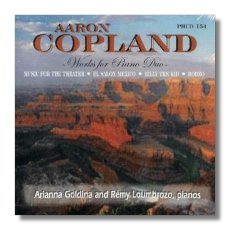
The Internet's Premier Classical Music Source
Related Links
- Copland Reviews
- Latest Reviews
- More Reviews
-
By Composer
-
Collections
DVD & Blu-ray
Books
Concert Reviews
Articles/Interviews
Software
Audio
Search Amazon
Recommended Links
Site News
 CD Review
CD Review
Aaron Copland

Music for Two Pianos
- Dance of the Adolescent
- Music for the Theater
- El Salón México
- Billy the Kid
- Two Dance Episodes from Rodeo
- Danzon Cubano
- Danza de Jalisco
Arianna Goldina, Rémy Loumbrozo, pianos
Phoenix USA PHCD154 DDD 73:46
Copland produced a small but important body of work for solo piano; here's a useful collection of his works for two pianos (or one piano, four hands). More accurately, here are works that were either written for two pianos and later orchestrated, or written for orchestra and later arranged for two pianos. Sometimes the latter task was accomplished by the composer. At other times, it was done by friends or colleagues such as Leonard Bernstein (El Salón México) and the two-piano team of Arthur Gold and Robert Fizdale (the two dance episodes from Rodeo). Among the several unusual selections on this CD, there is one world première recording: Music for the Theater, arranged by the composer for one piano, four hands.
This music is more familiar in its brilliant orchestral garments; Copland was a savvy orchestrator, and was not shy about using vibrant colors. As is often the case, these two-piano versions sound like black-and-white reproductions, and one finds oneself comparing the two versions, or hearing the orchestral version on one's inner ear. Having said that, beyond the novelty appeal of hearing Copland's music played this way – and played so well by Goldina and Loumbrozo – one can better realize its percussive qualities and its harmonic skeleton when it is played by two pianists. In other words, one usually puts cheese on a cracker – or tuna salad, or caviar, or what have you – but if the cracker is tasty enough, sometimes one eats the cracker by itself. Copland's crackers are always tasty, and while I wouldn't want to spend my lifetime denied cheese spread, I don't mind enjoying an unadorned cracker now and them to see what previously hidden tastes might arise.
Goldina and Loumbrozo are a husband and wife team; this is their third recording for Phoenix USA. She was born in Latvia, he was born in France, and they met at the Juilliard School in New York City. Just to prove that the United States is a melting pot, they give idiomatic performances of this quintessentially American music! The engineering is not among the most exciting I've heard – the piano tone is dry – but at least Copland's music doesn't disappear in echoes and overtones, as would have happened on a more resonant recording.
Copyright © 2004, Raymond Tuttle


















